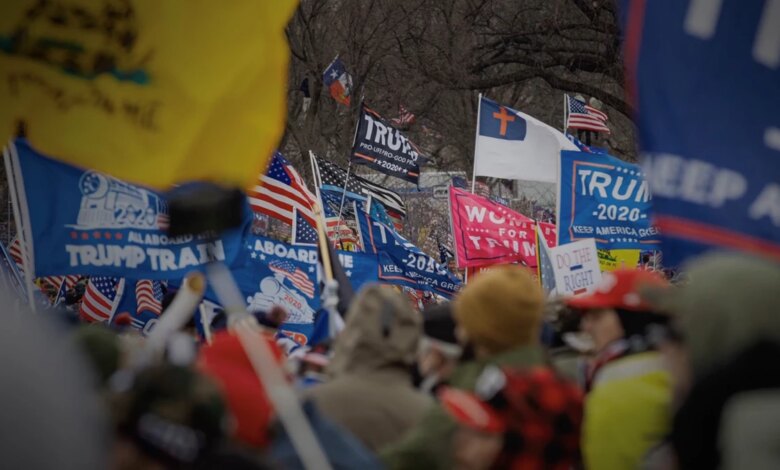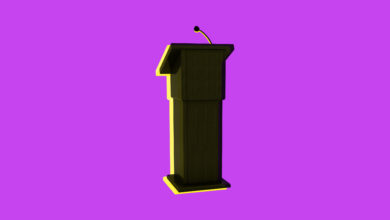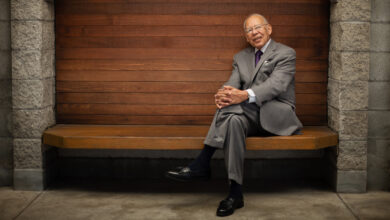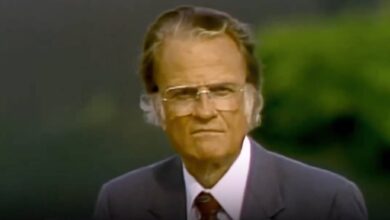‘God & Country’ Preaches to the Choir

Heave an egg out a Pullman window,” social critic H. L. Mencken famously said in 1925, “and you will hit a fundamentalist anywhere in the United States.” I often think about Mencken’s line when I read the coverage of evangelical Christianity at left-leaning websites such as Salon, Rolling Stone, Mother Jones, and MSNBC—drop an egg out of a Boeing 737 at 30,000 feet above red America, and you will hit a “Christian nationalist.”
Discussion of Christian nationalism has exploded in the last three years. The phenomenon has been blamed for the Trump presidency, the January 6th insurrection, the overturning of Roe v. Wade, and the possibility of another win for former president Donald Trump on Election Day. The latest offering in this vein is God & Country, a documentary film that arrives in theaters this month.
Directed by Dan Partland and produced by Rob Reiner, God & Country astutely includes interviews with high-profile Christian intellectuals, activists, and authors including Jemar Tisby, David French, Kristin Kobes Du Mez, Phil Vischer, Skye Jethani, Doug Pagitt, Rob Schenck, and CT editor-in-chief Russell Moore. Yes, the selection communicates, even these people think Christian nationalism is dangerous.
In one sense, God & Country is a brilliant piece of documentary filmmaking. It succeeds in warning against political extremism in the name of Christ and makes a significant and necessary contribution to our understanding of American religion and politics in the Trump era.
Many scenes are hard to forget: There are Seven Mountain dominionists in a packed arena reciting the “Watchman’s Decree,” a prayer to “take back and permanently control positions of influence and leadership” in business, entertainment, media, government, family, education, and religion. There are Christian flags and “Jesus Saves” signs at the Capitol as rioters smash windows and assault police. And there’s Christian Coalition politico Ralph Reed bragging about how his lobbying group would help turn North Carolina red using an invasive collection of voter data.
But though the core message of the film is true—this kind of extremism is antithetical to the gospel of Jesus Christ—God & Country suffers from a consistent failure to define its terms and distinguish its subjects. In the end, the movie raises more questions than it answers and will be limited in its persuasiveness to viewers who don’t already share its concerns.
Here’s one such question: Is there a difference between American evangelicalism and Christian nationalism? If asked, I’m sure all the evangelicals who speak in the film would answer with a resounding yes, and I suspect the other interviewees as well as Partland and Reiner would too. But the distinction is blurry in God & Country.
For example, a few minutes into the movie there are, by my count, 22 historical images that flash across the screen as the mid-20th-century Pentecostal and prosperity gospel preacher Jack Coe’s rendition of the gospel song “Job’s God Is True” plays in the background. A few of these images show Christians near an American flag, but most of them portray ordinary believers raising their hands in worship, bowing their heads in prayer, or listening to a sermon. What makes them Christian nationalists? How do they pose a threat to democracy?
Likewise, images of evangelist (and CT cofounder) Billy Graham appear in the film. Is the argument that he was a Christian nationalist, as the larger context and historical arc of the movie suggests? Or, in another scene, we see churchgoers singing the popular hymn “Faith of Our Fathers,” which celebrates Catholic martyrs in Reformation-era England. Does singing this song make one a Christian nationalist?
Also unanswered is whether evangelicals who want to bring our faith to bear on public life are necessarily Christian nationalists. Again, I have no doubt that the film’s makers and participants would answer in the negative. But there are multiple places in God & Country—footage of Jerry Falwell Sr. preaching against abortion and George H. W. Bush proclaiming he is pro-life and opposed to partial-birth abortion, to name just two—where the storytelling conflates politically active evangelicalism with Christian nationalism.
I’m guessing other experts drew this distinction in their interviews, but only Moore’s definitive statement distinguishing defenders of the traditional family and the unborn from Christian nationalists survived Partland’s cutting room.
Likewise, what’s the difference between Christian nationalism and symbols of American civil religion? God & Country leaves viewers with the impression that the slogan “In God We Trust” on our currency or “under God” in the Pledge of Allegiance are somehow connected to what happened on January 6th. It’s true that the differences between such vestiges of civil religion and the dominionism undergirding actual Christian nationalism are not easily parsed. But Partland and Reiner seem uninterested in trying to make a nuanced distinction.
That kind of loose history and language are regrettable and will limit God & Country’s reach. This is a film for people who read those articles in Salon and Rolling Stone. For those already inclined to believe that conservative evangelicals are plotting to create a theocracy in the United States, God & Country will confirm their fears about politically active born-again Christians and maybe motivate them to vote in November. It will give the left side of the culture war plenty of additional ammunition and perhaps some new insight into—but little sympathy for—the motivations of Trumpist evangelicals.
It probably won’t shift those motivations, though. Christians who supported the insurrection at the Capitol or attend MAGA rallies, if they watch God & Country at all, are unlikely to come away with changed hearts and minds. If you liked French before seeing the movie, you might like him even more when you’re leaving the theater. But if you think he’s selling out to secularists, God & Country will only confirm that feeling of betrayal.
Some interviewees in God & Country call for a different kind of “Christian nationalism,” one that cares for the sick, welcomes the stranger, and tends to the hungry. “If we do this right,” says Poor People’s Campaign co-chair William Barber in the final scene, “what a country we will be!” I hope this message will get through to some evangelicals. Yet as a veteran of the battle against the kind of extremism depicted in the film, I am not optimistic that it will, given the tone of the rest of the movie.
We need a deeper and more complex conversation about evangelicals and politics. For all its cinematic brilliance, God & Country just preaches to the choir.
John Fea is distinguished professor of history at Messiah University and executive editor of Current.




